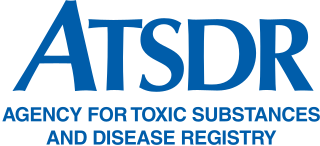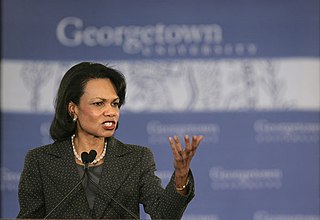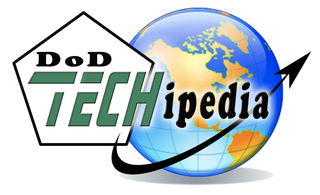
The United States Department of State (DOS), commonly referred to as the State Department, is a federal executive department responsible for carrying out U.S. foreign policy and international relations. Established in 1789 as the nation's first executive department, its duties include advising the President of the United States, administering the nation's diplomatic missions, negotiating treaties and agreements with foreign entities, and representing the U.S. at the United Nations.

The Agency for Toxic Substances and Disease Registry (ATSDR) is a federal public health agency within the United States Department of Health and Human Services. The agency focuses on minimizing human health risks associated with exposure to hazardous substances. It works closely with other federal, state, and local agencies; tribal governments; local communities; and healthcare providers. Its mission is to "Serve the public through responsive public health actions to promote healthy and safe environments and prevent harmful exposures." ATSDR was created as an advisory, nonregulatory agency by the Superfund legislation and was formally organized in 1985.
In international relations, public diplomacy or people's diplomacy, broadly speaking, is any of the various government-sponsored efforts aimed at communicating directly with foreign publics to establish a dialogue designed to inform and influence with the aim that this foreign public supports or tolerates a government’s strategic objectives. As the international order has changed over the 20th century, so has the practice of public diplomacy. Its practitioners use a variety of instruments and methods ranging from personal contact and media interviews to the Internet and educational exchanges.

The United States Intelligence Community (IC) is a group of 17 separate United States government intelligence agencies, that work separately and together to conduct intelligence activities to support the foreign policy and national security of the United States. Member organizations of the IC include intelligence agencies, military intelligence, and civilian intelligence and analysis offices within federal executive departments. The IC is overseen by the Office of the Director of National Intelligence (ODNI), which itself is headed by the Director of National Intelligence (DNI), who reports to the President of the United States.

The Bureau of Intelligence and Research (INR) is an intelligence agency in the United States Department of State whose primary mission is to provide all-source intelligence and analysis for U.S. diplomats. It is the oldest civilian intelligence agency in the U.S. Intelligence Community, as well as one of the smallest, with roughly 300 personnel.

The Foreign Service Institute (FSI) is the United States federal government's primary training institution for employees of the U.S. foreign affairs community, preparing American diplomats as well as other professionals to advance U.S. foreign affairs interests overseas and in Washington. FSI provides more than 800 courses—including over 70 foreign languages—to more than 170,000 enrollees a year from the Department of State and more than 50 other government agencies and the military service branches. FSI is based at the National Foreign Affairs Training Center in Arlington, Virginia.

Sister Cities International (SCI) is a nonprofit citizen diplomacy network that creates and strengthens partnerships between communities in the United States and those in other countries, particularly through the establishment of "sister cities". More than 2,000 cities, states and counties are partnered in over 140 countries around the world. The organization "strives to build global cooperation at the municipal level, promote cultural understanding and stimulate economic development".

The Under Secretary for Public Diplomacy and Public Affairs is currently a top-10 ranking position in the U.S. Department of State that is intended to help ensure that public diplomacy is practiced in combination with public affairs and traditional diplomacy to advance U.S. interests and security. The Under Secretary oversees three bureaus at the Department of State: Educational and Cultural Affairs, Public Affairs, and International Information Programs. Also reporting to the Under Secretary are the Office of Policy, Planning and Resources for Public Diplomacy and Public Affairs and the Advisory Commission on Public Diplomacy.
The Office of eDiplomacy is an applied technology think tank for the United States Department of State. The Office of eDiplomacy is staffed by Foreign and Civil Service Officers, as well as contract professionals. There are three branches, the Diplomatic Innovation Division, the Knowledge Leadership Division and the Customer Liaison Division.

The Bureau of Educational and Cultural Affairs (ECA) of the United States Department of State fosters mutual understanding between the people of the United States and the people of other countries around the world. It is responsible for the United States Cultural Exchange Programs.

The U.S. Department of State's Bureau of International Information Programs (IIP) supports the department's public diplomacy efforts by providing and supporting the places, content, and infrastructure needed for sustained conversations with foreign audiences. IIP is one of three bureaus that report to the Undersecretary for Public Diplomacy and Public Affairs. The Bureau of Educational and Cultural Affairs and the Bureau of Public Affairs are the sister bureaus.

Transformational Diplomacy is a diplomacy initiative championed by former United States secretary of state Condoleezza Rice for reinvigorating American Foreign Policy and the United States Foreign Service.

Diplopedia, billed as the Encyclopedia of the United States Department of State, is a wiki running on a State internal Intranet, called "OpenNet". It houses a unique collection of information pertaining to diplomacy, international relations, and Department of State tradecraft.

DoDTechipedia is a wiki developed by the United States Department of Defense (DoD), to facilitate increased communication and collaboration among DoD scientists, engineers, program managers, acquisition professionals, and operational warfighters. DoDTechipedia is a living knowledge base that reduces duplication of effort, encourages collaboration among program areas, and connects capability providers with technology developers. DoDTechipedia runs on Confluence wiki engine, unlike a number of MediaWiki-based government wikis like Diplopedia and Bureaupedia.
DipNote is the official blog of the United States Department of State. It was started on September 25, 2007 with a first post by the U.S. Assistant Secretary of State for Public Affairs Sean McCormack. DipNote was revised in 2009, with the Departments' 21st Century Statecraft initiative. DipNote works in conjunction with other public diplomacy programs as part of former Secretary of State Hillary Clinton's smart power initiatives.
The Secretary's Office of Global Partnerships (S/GP) is the entry point for collaboration between the U.S. Department of State, the public and private sectors, and civil society. Launched in 2009, S/GP aims to strengthen and deepen U.S. diplomacy and development around the world through partnerships that leverage the creativity, innovation, and core business resources of partners for greater impact. The Special Representative for Global Partnerships is Andrew O'Brien.

Richard Boly is a former career U.S. diplomat and former Director of the Office of eDiplomacy, an applied technology think tank for the U.S. Department of State. Previously, he was a National Security Affairs Fellow at the Hoover Institution at Stanford University, where he launched the Global Entrepreneurship Program.

Cyber-diplomacy is the evolution of public diplomacy to include and use the new platforms of communication in the 21st century. As explained by Jan Melissen in The New Public Diplomacy: Soft Power in International Relations, cyber-diplomacy “links the impact of innovations in communication and information technology to diplomacy.” Cyber-diplomacy is also known as or is part of public diplomacy 2.0, EDiplomacy, and virtual diplomacy. Cyber-diplomacy has as its underpinnings that, “it recognizes that new communication technologies offer new opportunities to interact with a wider public by adopting a network approach and making the most of an increasingly multicentric global, interdependent system.”
According to the author Christopher Paul (RAND),Strategic Communication is the "coordinated actions, messages, images, and other forms of signaling or engagement intended to inform, influence, or persuade selected audiences in support of national objectives." There is often debate and discussion concerning what makes strategic communication. Regarding definition, psychological operations, public or civil affairs, information operations and public diplomacy are seemingly the least contested components of U.S. strategic communication. With those components, the most important factor that separates strategic communication from other types of communication is the synchronization and coordination of U.S. efforts. For example, in the National Strategy for Public Diplomacy and Strategic Communication, all strategic communication efforts activities should:

The Bureau of Energy Resources (ENR) is an agency in the United States Department of State that coordinates the department's efforts in promoting international energy security. The bureau is under the purview of the Under Secretary of State for Economic Growth, Energy, and the Environment.








